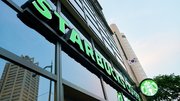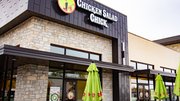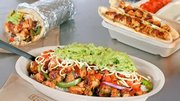A View From The Top
What Qdoba CEO learned from COVID-19 pivot
Qdoba CEO Keith Guilbault reveals the strategy behind the brand's pandemic pivot, including setting up a COVID response team, focusing on first-party digital business, creating a to-go hot bar and catering to smaller groups.

August 23, 2021 by Cherryh Cansler — Editor, FastCasual.com
The pandemic obviously forced restaurants around the world to change their operations models, and Qdoba was no exception. With nearly 800 locations, however, pivoting wasn't easy, but CEO Keith Guilbault knew it was the only way for the brand to survive.
"Across all Qdobas, our employees had to adapt to increased complexity, including managing more channels within the restaurant while learning new order modes," he told FastCasual. "These adaptations occurred both in-restaurant and in digital and off-premise capacities, specifically related to the pick-up and delivery processes."
As well as leaning into health and safety measures, including hand sanitizer stations and health messaging reminders in dining rooms, Qdoba's second focus was on driving digital innovation. That meant establishing curbside pick-up within 72-hours at the height of the pandemic.
"For these digital orders, we implemented a second production line and kitchen display systems to ensure efficiency," Guilbault said. "Our team created and launched detailed order accuracy standards for our customer's digital orders in alignment with Qdoba's hospitality standards."
Those standards have become a permanent part of the operations model, said Guilbault, who recently chatted with FastCasual about Qdoba's pandemic strategy and how it has forever changed the way the company conducts business.
Q. What challenges did Qdoba face and how did it respond to those challenges?
A. The most obvious challenge was that Qdoba's dining rooms shut down, so we were unable to serve our guests in a traditional, fast-casual way. Our solution was to leverage our existing digital infrastructure and supplement new digital innovations to meet our customer's needs, such as digital ordering, pick-up and delivery.
In a corporate capacity, our headquarters — Qdoba Flavor Central — also closed. Our team leveraged existing remote communication procedures which included video conferencing and file-sharing platforms. We saw that this empowered functional leaders to drive intentional remote connectivity through frequent touch-bases, team meetings and leveraging the platform to mimic our collaborative physical work environment as much as possible. Once local ordinances permitted, we then allowed in-office volunteers.
Like all businesses, there was the general challenge of never experiencing a pandemic of this proportion and how to react to a high-scale crisis. With that said, we created a COVID Response Team responsible for assessing industry and pandemic headwinds, communicating relevant information to key stakeholders and evolving and implementing health and safety protocols.
As the CEO of a company in which I deeply care for all of my employees, I understand the fear they faced and continue to face throughout this pandemic. In the beginning, the limited information made it difficult to find comfort but with new updates and frequent communication among Qdoba employees, we learned how to support our teams. We provided frequent video communications directly to field employees to discuss the evolving health and safety information. We reinforced the value we bring communities as an essential service and that maintaining our business meant maintaining jobs and supporting families. Qdoba also created a one-stop-shop eLearning course for employees that could be updated in real-time with the most relevant information.
Qdoba created different tiers of operations to help the team understand how to conduct business based on mandates that applied to the local area. We also made social distancing changes to our dining rooms that will remain in place.
Overall, our greatest challenge was bringing our flavorful food to guests while navigating through the mandates that local and state jurisdictions enacted in response to the pandemic. From the beginning of the pandemic, the cross-functional group of individuals behind the COVID Response Team helped to drive the health and safety measures needed while sustaining the business. The COVID Response Team continues to meet several times a week to discuss new challenges and ways to deliver solutions.
Q. What has Qdoba done to customize its catering to groups, businesses and/or events?
A. To provide a safer and more personalized experience, we pivoted to catering to smaller groups to adhere to social distancing and group gathering guidelines. We added family meals for smaller groups of four or five. We expanded the variety in our existing individual meals category by adding queso burrito and classic salad meals.
Qdoba also added a hot bar for groups of 10 to order online and allow for easier pickup. What makes our catering program so successful is the flavorful, delicious food that pleases everyone. Our hot bar is a great example of our flavor variety and is served ready-to-eat with chafing racks, individually packaged utensils and is available with seamless delivery and set up — a major differentiator in our category. Qdoba continues to test additional smaller group offerings as we know that many of our guests will continue to adhere to smaller gatherings as the future is unclear.
Q. What changes were you able to implement during the pandemic, such as online ordering for pickup and delivery?
A. Qdoba anticipated the acceleration of digital ordering before the pandemic, which is why we invested in a new digital platform that launched in January 2020 – just two months before the pandemic hit. This included integration of third-party delivery orders into our POS which streamlined operations by getting off multiple tablets for order fulfillment. The change in guest behavior required us to be very nimble, and we responded by launching curbside pickup in a matter of four days, which included configuring the technology, building out our operational processes and communicating with our guests. We also launched delivery directly through our website and app to meet the needs of our guests.
The Qdoba Rewards App, which launched in January 2020, allowed us to better integrate our rewards experience with online ordering. We found that our digital customers are more likely to repeat visits than our in-restaurant customers, and providing an easier way for those guests to create accounts and access previous orders helped us retain our guests as they moved to digital.
Q. Have you seen success with any of the new models?
A. Our first-party digital business has brought in a customer type that is easier to retain and drive additional purchases. Specific to order mode, our first-party delivery business has driven a higher-than-expected average check, and we've been able to continuously increase the profitability of those transactions.
Curbside pickup is also a great example of how Qdoba pivoted to meet the evolving safety and convenience needs of our guests.
Q. Will you keep any of the new models in place post-pandemic?
A. Rather than see the pandemic as an event with a start and end date, we see it more as a generational shift in consumer behavior. We expect delivery, curbside and online ordering to accelerate in the months and years ahead. We're continuously evaluating all of our handoff modes to deliver a great guest experience in a way that's profitable for Qdoba.
Q. Explain how Qdoba's continued innovations have shaped Qdoba's success in its industry.
A. At Qdoba we believe the restaurants are the center of our universe, from the guest experience to the food. Our innovation has focused on how we deliver a great guest experience through our restaurants and our team members. We are also continuing to innovate in food, with new, on-trend flavors that are completely unique to the category, such as Cholula Hot & Sweet Chicken, our new Flavor Bar add-ons like Jalapeno Verde, Chile Crema and Pickled Red Onions, and more exciting flavors on the horizon.
Q. What advice would you give to struggling restaurants and businesses facing the impact and lingering effects of the pandemic?
A. First and foremost, stay focused on your customers and your team members, and always seek opportunities to make their lives easier. No matter the size of your company, maintain a cross-functional team that meets regularly to discuss any challenges and solutions for mitigating risks.
Another important learning strategy is to stay in contact with your restaurant peer group to share any best practices. They should have flexible levels of operations that allow the operators to smoothly relax or contract operations based on changing mandates due to the ongoing pandemic issues.
More advice is as follows:
- Don't grow weary executing the basics of strong leadership with a focus on people, systems and processes.
- Stay curious, solution-focused, high-energy and nimble.
- Keep your foot on the gas pedal.
 ChatGPT
ChatGPT Grok
Grok Perplexity
Perplexity Claude
Claude












